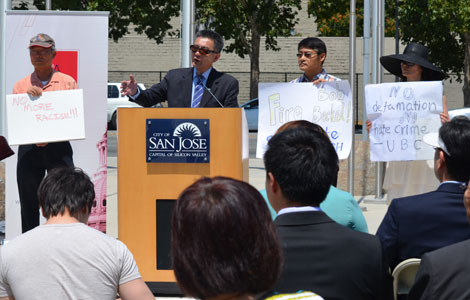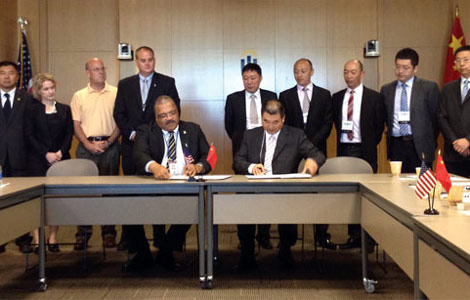Ministry urges prudence over solar dispute
Updated: 2014-07-29 06:15
By XIE YU in Shanghai and AMY HE in New York (China Daily USA)
|
||||||||
China's Ministry of Commerce has urged the United States to handle the latest dispute over solar trade "prudently," saying that trade friction is unavoidable but governments have a responsibility to prevent it from harming China-US relations.
The ministry's comment on Monday followed a preliminary decision by the US Commerce Department on July 25 to extend punitive duties on Chinese solar products. The department imposed anti-dumping duties as high as 165.05 percent on solar panels and cells from the Chinese mainland, on top of countervailing duties set a month earlier. Producers from Taiwan also face anti-dumping duties of up to 44.18 percent.
"China strongly disapproves of the US action," an unidentified official from the trade remedies and investigations bureau of the Commerce ministry said in a statement on its website.
The statement said the US government's latest investigation of Chinese solar products is increasing trade friction and could hurt the upstream and downstream sectors of the solar industry in both countries.
"The frequent adoption of trade remedies cannot resolve the US solar industry's development problems. We hope the US can prudently handle this investigation, quickly end investigation procedures and create a good environment for competition in the global solar industry," the statement said.
Trade friction is unavoidable, but governments have a responsibility to prevent it from harming China-US relations, the official said.
The China Chamber of Commerce for Import and Export of Machinery and Electronic Products also expressed its "strong disapproval" in a statement on Monday, saying the Chinese companies will "take every legal measure" to protect their rights and interests and firmly resist any individual company's "selfish" behavior that disturbs the global solar industry.
"The ruling is actually worse than expected. It is mainly focused on solar modules manufactured in the mainland that use solar cells made in Taiwan," said Li Rongkun, general manager of Phono Solar Technology Co Ltd, which is based in East China's Jiangsu province.
The latest round of investigations into Chinese solar products, which began earlier this year, are meant to "close a loophole" allegedly used by Chinese manufacturers since 2012, when the US imposed tariffs on solar cells made in the Chinese mainland.
The cells are the building blocks of solar panels. Chinese mainland companies have been able to avoid paying duties by assembling panels with cells made in locations such as Taiwan.
US analyst Michael Barker said that the response from the Chinese government is "fairly typical" and is unlikely to impact the pace of the investigation. It should be noted, the senior analyst at NPD Solarbuzz said, that the final determination has already been delayed by four months from the original target. The final determination is set to come in December.
Phono Solar Technology began to use Taiwan-made solar cells after the 2012 ruling, but the company now faces new tariffs of 165.05 percent, although a final ruling on the latest tariffs will not be made until December. Exports to the US account for about 10 percent of Phono Solar's annual shipments, according to Li.
"We'll have to stop using Taiwan-made solar cells. There are two alternatives," said Li. "We can use mainland-produced solar cells, but then we'll have to pay the punitive duties set in 2012, which will be about 29 percent. The other option is to find an overseas contract producer" and avoid the duties entirely, Li said.
China's exports of solar products to the US have been declining because of multiple rounds of anti-dumping and countervailing duties. In a ruling on July 14, the World Trade Organization said that some punitive US import duties on Chinese products, including solar panels, are inconsistent with US trade commitments and violate US commitments to WTO rules.
Jigar Shah, president of the Coalition for Affordable Solar Energy, an organization that represents US installers, said the latest ruling is "another unnecessary obstacle for the US solar industry" that will hinder the deployment of clean energy by raising the prices of solar products.
"Due to these tariffs, previously viable projects will go unbuilt, American workers will go unhired, and consumers who could have saved money through solar energy may not be able to benefit," he said.
He urged the administration of President Barack Obama to reconsider how to handle solar trade disputes and help negotiate a win-win settlement that supports growth across all sectors of the US solar industry.
Contact the writers at xieyu@chinadaily.com.cn and amyhe@chinadailyusa.com.

 Silicon Valley rally calls on Fox News to fire Beckel
Silicon Valley rally calls on Fox News to fire Beckel
 Look who's two, Xiao Liwu!
Look who's two, Xiao Liwu!
 Philadelphia Orchestra meets the press
Philadelphia Orchestra meets the press
 Chinese, US naval hospital ships conduct exchange
Chinese, US naval hospital ships conduct exchange
 High rent pressures NYC Asian eateries
High rent pressures NYC Asian eateries
 Artists advocate for environmental protection
Artists advocate for environmental protection
 Wichita, Kansas to Xi'an, China: Come fly with us
Wichita, Kansas to Xi'an, China: Come fly with us
 Amateur team aims for great heights
Amateur team aims for great heights
Most Viewed
Editor's Picks

|

|

|

|

|

|
Today's Top News
Ex-security chief Zhou Yongkang under probe
Microsoft probed for monopoly
4 charged for murdering student
Prudence urged over solar dispute
Baidu developing 'self-driving' car
US visa delays likely to continue
McDonald's fishing for supplier
OSI group to fund food safety
US Weekly

|

|






